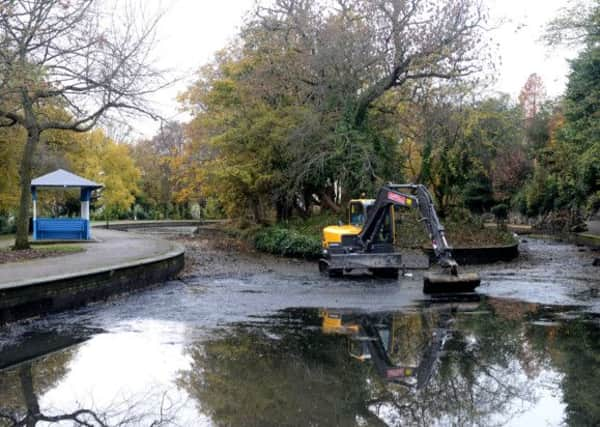Lake restoration’s hidden challenges


It had been thought that simple repairs to the base and part of the walls would stop molten tar bubbling to the surface of the lake in Dewsbury’s Crow Nest Park.
But studies completed after it was drained and de-silted late last year uncovered a much bigger task.
Advertisement
Hide AdAdvertisement
Hide AdA spokeswoman for the Love our Lake project said: “Victorian lakes were sometimes constructed using a layer of bitumen as a waterproof membrane and in the case of Crow Nest’s lake this technique was used for both the base and sides.
“In recent years this bitumen barrier has broken down and thus the molten tar has been dispersed into the lake and at times bubbled up to the surface.”
The discovery that more comprehensive repairs are needed has proved a challenge for the Friends of Crow Nest Park and Kirklees Council, who are working together on the project.
They had secured £52,900 from the Heritage Lottery Fund to cover the cost of simple repairs and a community education programme.
Advertisement
Hide AdAdvertisement
Hide AdBefore seeking the funding, the council had the lake examined by a restoration expert who gave an estimate for the works.
“The understanding at this time was that a simple repair was required to the base and some repair and re-pointing work to the walls,” the spokeswoman said.
“The accepted risk was that the final amount of works could not be determined until the lake was drained and de-silted.”
This month the Friends and council met to find an alternative solution that fits the existing budget.
Advertisement
Hide AdAdvertisement
Hide AdExtra tests are due to be carried out on the sides of the lake soon.
Full refurbishment work to the sides and base, which must be carried out during dry spells, will take around a month.
It is hoped that this can be carried out in March if the weather is good enough.
In the meantime, members of the Friends, Dewsbury Matters and the community are continuing to collect memories of the park for an oral history project.
And 370 schoolchildren have taken part in guided walks and art and heritage workshops.
The project team has also been taking part in national recording days, including the RPSB’s Big Garden Birdwatch.